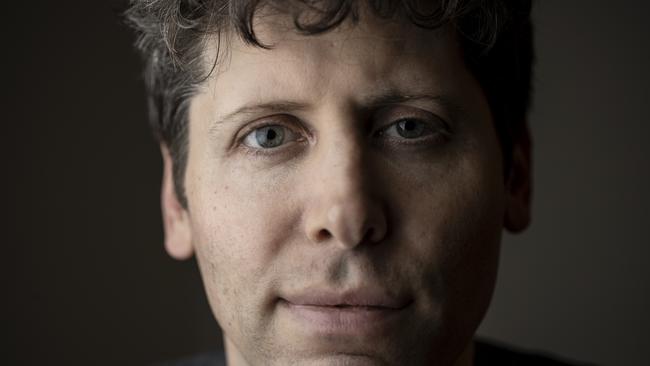Could ChatGPT replace your financial adviser?
A shortage of professionals could be overcome with the integration of artificial intelligence into the advisory process.

Sam Altman, the founder of the Artificial Intelligence sensation ChatGPT, sat on stage in front of 2000 people earlier this year at the Melbourne Convention Centre.
The questions from an enraptured audience were fast and furious. Would AI create unemployment? Would AI threaten the world as we know it?
Altman remained rational and measured throughout the Q&A session: unfailingly courteous. He was ready to address almost any subject.
When Altman finally was asked about the changes AI would make to business activity, he identified a sector the tech geeks might not have been expecting – financial advice. It was, he said, an job where AI’s ability to process large volumes of predictable data could be transformative.

It is unlikely Altman is familiar with the Australian financial advice sector, but his timing was perfect. Our open economy and mandated superannuation savings policy have combined to create a “mass affluent” market that should be a haven for investors of every description. But the system has a big problem – financial advice is beyond the financial reach of most people.
Ironically, in the face of rising wealth – not to mention the prospect of intergenerational wealth transfer – the nation’s financial advice sector has shrunk dramatically.
After a shocking series of scandals and the subsequent departure of banks from the industry, the advice sector is going backwards in terms of professional numbers.
Paralysed by excessive regulation and divided over educational standards, 9000 advisers left the industry in the three years to 2022. There are about 16,000 advisers left in the sector.
As the professional ranks thinned out, prices for financial advice rose: the average annual cost of professional advice is about $3500 a year – a figure which can only be justified if an investor has more than a million dollars under management.
The promise of AI – which has accelerated with the development of products such as Chat GPT – is financial advice on a mass scale at an affordable price. That has been the holy grail of financial advice for a decade but never been truly feasible, until now.
If we use Chat GPT itself to forecast whether so-called “iterative AI” will change financial advice, the service responds as follows (without a morsel of doubt): “The future of financial advice lies in the convergence of AI and human expertise … AI can tailor financial advice to individual clients gauging risk tolerances and preferences.”
That promise of a seamless and very cheap alternative to traditional advice looks decidedly possible: across the country, among larger financial institutions, AI specialists are commonplace. But the exit of banks from financial advice in recent years suggests innovative AI use will come from smaller operators who can launch new services without the restrictions of bureaucracy.
Ben Neilson of the Neilson & Co group was one of the first advisers to grapple with AI. In January this year he said AI could provide set piece financial advice such as a “super contribution schedule” for a fraction of the usual cost.
Neilson suggested that: “A median fee expectation for a ‘super contribution recommendation’ across the four major Australian financial advice licensees is roughly $900 and requires just over three hours of attention.
AI software was able to recreate the recommendation with elevated levels of language for just over $200 and required just over 30 minutes.”
It was a big call. Now, almost a year later, the advice scene is buzzing with possibility.
Somewhat counter to the prevailing trend, the Six Park group – one of the early exponents of “robo advice” – closed its doors in August this year. The venture was well funded and backed by some of the top names in local finance but failed to create a profitable business model.
Ironically, Six Park may just have been too early to capture the possibilities now emerging. But as their customers are transferred across the sector (nobody lost money), the outlook is improving for robo advice rivals such as Stockspot and Dash.
Both Stockspot, led by Chris Brycki, and Dash, led by Andrew Whelan, are already leaders in creating low-cost, low-touch service proposals backed by technology where the customers upload their information and software leads them towards solutions.
Moreover, the evolution of index-based funds which allow investors an avenue into listed markets has been ideal for robo advice in Australia and in the US where the market has been advancing quite rapidly through groups such as Betterment.
Individual advisers are also innovating – James Gerrard, of financialadviser.com.au, has been a keen adopter of new technology.
Gerrard jumped into AI technology and has gone well beyond toying with the software: He has used new AI software to “deepfake” himself and has loaded up his advice avatar with a lexicon of financial terms that will be used in the future.
The result is that his staff can create scripts for an AI-generated version of Gerrard which can be circulated to clients when there is important information to be communicated.
Gerrard is fortunate that many of his clients are tech industry employees who appear to be entirely comfortable with the format.
Similarly Will Hamilton of Hamilton Wealth Partners has put two of his team on an intensive course to study what might be possible with AI inside the advice arena.
Meanwhile, at the ASX-listed Iress finance technology group, chief executive Marcus Price believes financial advice could be cut from the prohibitive level of more than $3500 per annum to about $1000 per person.
In a recent investor address, Price cited new research, from consultants McKinsey & Co, which estimates 25 per cent of work activities could be automated by 2030.
According to Price: “The consultants are absolutely right on this issue: in financial advice we will soon not just have AI-backed tools, but a whole range of them.”
Perhaps the biggest opportunity for the providers of financial advice is at the back end: the so-called paraplanning end of the business which is the prosaic exercise of gathering and filling out documents and making sure advice given is executed efficiently while adhering to a raft of regulations.
One of Australia’s most interesting tech start-ups is paraplanner.ai which has set its sights on the global financial advice market, having received backing from the global early stage investment group, Antler. Alex Gassner of paraplanner.ai says that in the advice sector the core opportunity is to free up time for financial advisers to do more important work for their clients.
As entrepreneurs work on AI products that could ultimately “democratise” financial advice, the government has decided not to wait for technology to crash through. Instead federal Financial Services Minister Stephen Jones is pushing for big super funds to provide cheap financial advice.
Earlier this year, lawyer Michelle Levy released her long awaited Quality of Advice Review (QAR) which offered a deregulation solution to the issues facing financial advice.
In effect, Jones and the Albanese government sidestepped the key thrust of that report, but cherrypicked two themes that may make a big difference long term.
The government signed off on simplifying the excess regulation which has choked the sector since the Hayne royal commission in 2017.
But more importantly, Jones is opening the door for “big super” – especially industry super funds that dominate the field – to widen their ability to offer financial advice.
Controversially, he outlines a way forward where big super funds will not need to meet the onerous regulations forced on independent financial advisers.
As the Minister explains: “Most Australians do not have complex financial affairs that require a comprehensive plan from an adviser. They just want to know how their super works for them.”
Jones envisages a world where Big Super will offer adequate advice to millions of Australians who might not otherwise be able to pay for it.
It’s a worthwhile goal and the reality is that many investors will not be able to afford the quality of adviser that makes it onto our Top Financial Advisers List.
But the risks are obvious. Advice offered by less-qualified personnel operating inside the safety of a large institution is unlikely to be top quality. Moreover, there is the specific issue that a super fund is unlikely to recommend a customer moves his or her money – or any money – outside the fund. In this respect the government risks resurrecting the sort of problems which beset the banks less than a decade ago and led to the Hayne inquiry.
Indeed Jones appears more determined than the funds themselves. In August, he put clear pressure on the big funds to get started on mass financial advice, telling a Canberra retirement conference that the Retirement Income Covenant will mean it is “necessary” to provide advice.
According to Jones: “I expect funds to play an important role, in fact the increasing obligations that have been placed on funds make this a necessary step.”
While investors wait to see whether “big super” comes to the table, there is some early evidence the numbers employed in the advice industry are stabilising.
There are also signs of rebounding profitability.
The Financial Advice Efficiency report found that average advice practice enjoyed a 45 per cent increase in revenue between 2021 and 2023.
However, it also discovered the average practice has a shrinking payroll and is servicing fewer clients.
Clearly, it is an industry in woeful need of a breakthrough that makes advice a feasible service that can be offered to the wider population, not just the lucky minority who can afford it.
At first glance, a genuine expansion of advice for the everyday investor appears to hinge on either AI technology delivering on its promises or big super becoming a major player in the industry.
Both avenues have risks. In its early iteration AI is going to present off-the-shelf advice which will only suit the average investor with an average risk profile who is happy with the performance of index funds.
Separately, big super funds have shown little evidence that they are capable of going beyond investing funds for their members.
Already this year big super funds have been in trouble for delaying payments to investors on a number of fronts, particularly insurance payouts.
Levy, the architect of the QAR review, has openly expressed doubts about big super and advice.
“I worry this is the wrong place to start,” she said recently. “What is proposed might be too much and too hard and expose members to risk.”
Behind the wider debate is the reality that full and independent financial advice cannot be done cheaply.
Nonetheless, financial advisers are likely to win either way with AI. If “big super” gets serious about providing advice, the funds will likely outsource many advice functions to independent advisers.
Anna Fuchs, the acting chief of retirement at the giant Australian Retirement Trust, said recently: “At the moment when we determine it’s complicated, we’re sending them (members) to external financial advisers to deal with.”
It’s all to play for. All that financial advisers need to do now is find the time to explore how they might save time with AI.
This feature appears in The Deal/Barron’s Top 100 Financial Advisers 2023 magazine, online and in The Australian.





To join the conversation, please log in. Don't have an account? Register
Join the conversation, you are commenting as Logout